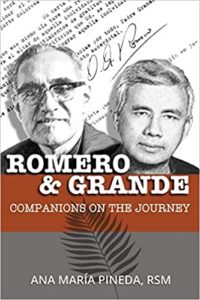The account of Rutilio Grande, S.J.’s contribution to the fight against the socio-political injustices in El Salvador during the 1970s, is often subordinated to that of his compatriot Archbishop Oscar Romero. In Romero & Grande: Companions on the Journey, Ana María Pineda, R.S.M. not only underscores the equal importance of the pastoral work of these two Salvadoran priests but, in bringing their stories together, harmonizes their differing approaches to the political and spiritual liberation of the Salvadoran people demonstrating a mutual influence. A volume of interest to a broad audience—liberation and pastoral theologians, Latin American religious historians, and those interested in Catholic studies—Pineda provides a story about the obstinate strength of two all-too-human, yet pious men in the midst of political repression. Believing their life stories have become elusive and vague (Romero was canonized a saint by the Catholic Church on Oct. 14, 2018 and calls remain for the canonization of Grande), Pineda highlights “the human dimensions of their spiritual lives,” arguing that they were ordinary men plagued by the quotidian struggles of life, yet living their Christianity in ways that would have a profound and lasting impact on the people of El Salvador (x).
Pineda takes a topical approach for each chapter. In brief sections, she associates global events (e.g., the 1929 U.S. stock market crash and the reforms of the Second Vatican Council) with the moment in each figure’s life identifying its impact. These overviews give the reader some contextual background, but the text is largely focused on Romero and Grande’s spiritual journeys. She begins with their upbringing in different economic classes of Salvadoran society, and further outlines their differing paths of formation for the priesthood and ministry—Romero drawn to academic study as a secular clergyman while Grande joined the Jesuits with the intention of fostering the growth of rural communities of faith.
Through personal correspondences and interviews with men and women who knew both, Pineda illuminates the differing spiritualities of the two. Romero sought to form a spiritual union with God through a life of prayer, while Grande nurtured a relationship with God by walking with the common people. In informative and absorbing prose, she continues to describe each man’s preaching, personal doubts, confrontations with adversity, and ultimately, their martyrdom. Over time, their divergent approaches melded into a unified pastoral goal. Plagued by personal doubts, Grande was sustained by an urgency for social action in defense of the oppressed peasant class of El Salvador. The emboldened preaching exemplified by Romero as Archbishop was shaped by this example of Grande, who’s assassination ultimately moved Romero to complement his intellectual inclination with Grande’s groundedness. It is well known that Romero and Grande were united in resistance to the violent conflicts of El Salvador, but this relationship was strengthened through the compassion that arises out of the ordinary human experiences of friendship.
Although a book about two of the most important figures of the Latin American Church, Pineda states that it is not intended to be biographical. She aims to present Romero and Grande as two models of Christian spirituality emphasizing their human frailty. Through extensive research she achieves this goal avoiding strong-handed saintly characterizations of either man. Some historians might appreciate a deeper contextual analysis to better understand the circumstantial forces of influence on their ministerial activism, while some theologians might appreciate a concerted reflection on their intellectual influencers. Nevertheless, while doing both could expand the volume, this work is well-organized and balanced in its coverage of Romero and Grande’s compatible pastoral labors, Pineda’s stated goal. It is here where Pineda excels most. While their lives have been linked historically in terms of the effect of Grande’s death on Romero (both otherwise understood to be opposites in political and pastoral approaches), Pineda’s perspective on the fuller complementarity and equal impact of both men on the violent situation in El Salvador evolves our understanding of their stories and ecclesiastical importance as models of the faith, making a significant contribution to the history of the church.
Southern Methodist University




